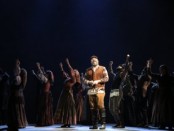Good Night, Oscar
Sean Hayes, up till now best known for his Emmy Award-winning performance as Jack McFarland on "Will and Grace," gives a titanic performance as humorist, raconteur and pianist Oscar Levant once called the wittiest man in America, in Doug Wright’s new play "Good Night, Oscar." Although Levant is not much remembered today, you can enjoy this character study and depiction of early late night television even if you have never heard of him before. While "Will and Grace" has made evident Hayes’ way with one-liners, "Good Night, Oscar" demonstrates that Hayes is able to dig deep in a character portrayal as well. Credit must go to director Lisa Peterson for inspiring this memorable performance. [more]



